An Analysis of Ethics, Values, and Dilemmas in Health and Social Care
VerifiedAdded on 2023/01/19
|9
|2534
|44
Report
AI Summary
This report explores the critical role of ethics and values in health and social care, particularly within the context of inpatient stroke rehabilitation. It outlines core ethical principles like fairness, respect, and accountability, and examines relevant legal and regulatory frameworks such as the Care Act, Mental Health Act, and Human Rights Act. The report further delves into ethical dilemmas faced by healthcare professionals, including patient refusal of care based on gender and inappropriate staff discussions, and proposes appropriate methods for resolving these issues, emphasizing the importance of professional boundaries and the application of value theory and ethical frameworks. The report highlights the role of regulatory bodies like CQC in ensuring the quality and safety of care, providing a comprehensive analysis of ethical considerations in healthcare settings. The report is contributed by a student to be published on the website Desklib.
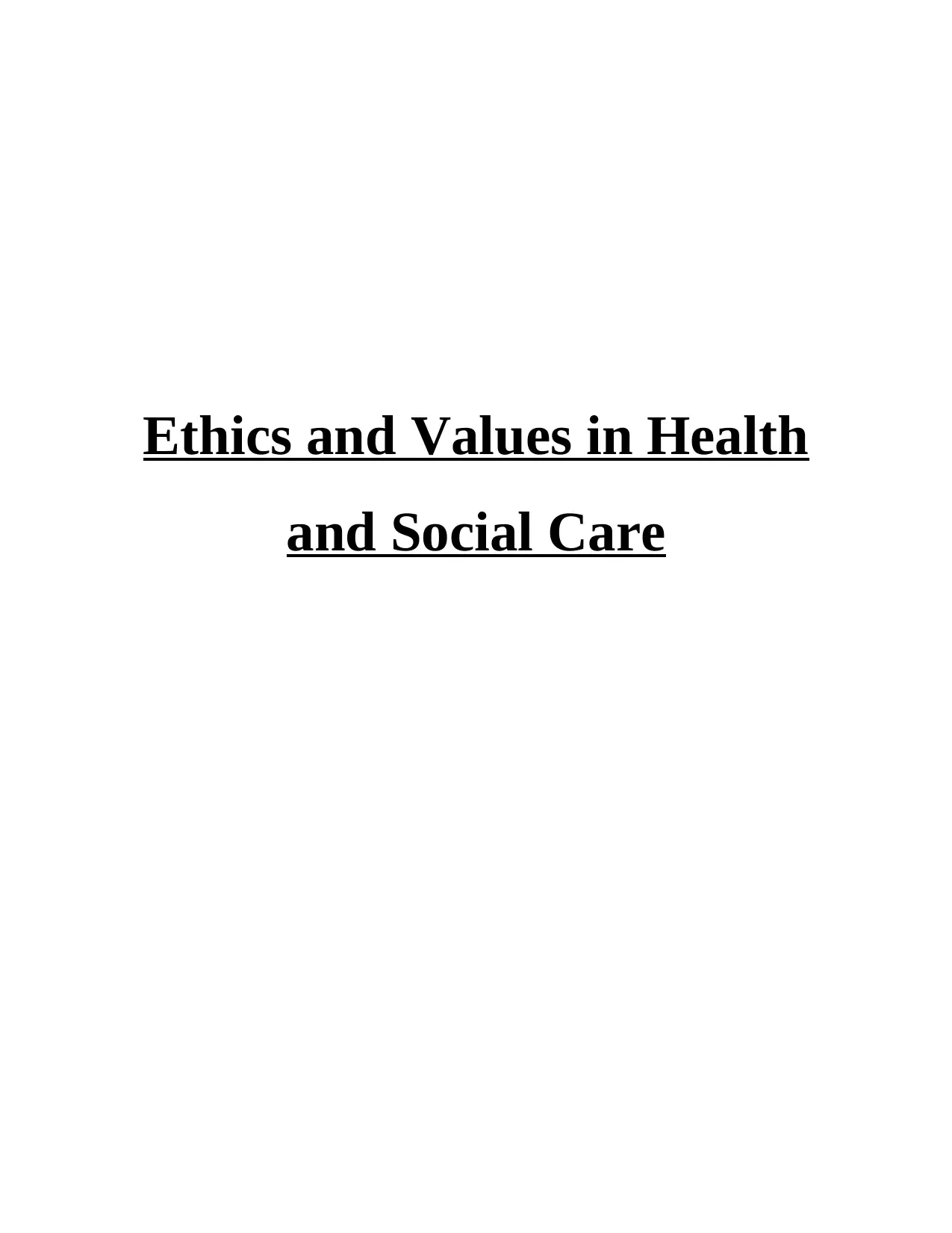
Ethics and Values in Health
and Social Care
and Social Care
Paraphrase This Document
Need a fresh take? Get an instant paraphrase of this document with our AI Paraphraser
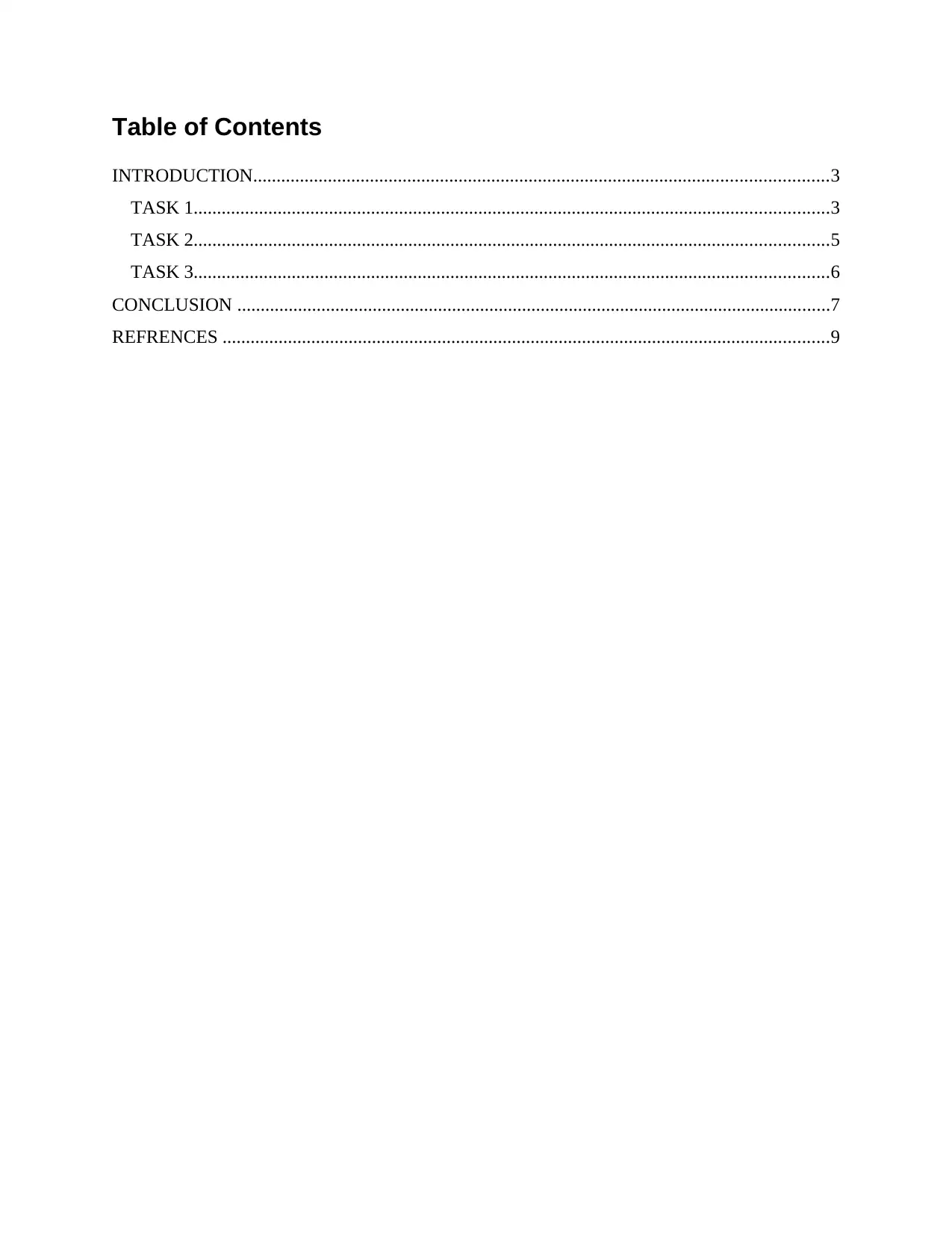
Table of Contents
INTRODUCTION...........................................................................................................................3
TASK 1........................................................................................................................................3
TASK 2........................................................................................................................................5
TASK 3........................................................................................................................................6
CONCLUSION ...............................................................................................................................7
REFRENCES ..................................................................................................................................9
INTRODUCTION...........................................................................................................................3
TASK 1........................................................................................................................................3
TASK 2........................................................................................................................................5
TASK 3........................................................................................................................................6
CONCLUSION ...............................................................................................................................7
REFRENCES ..................................................................................................................................9
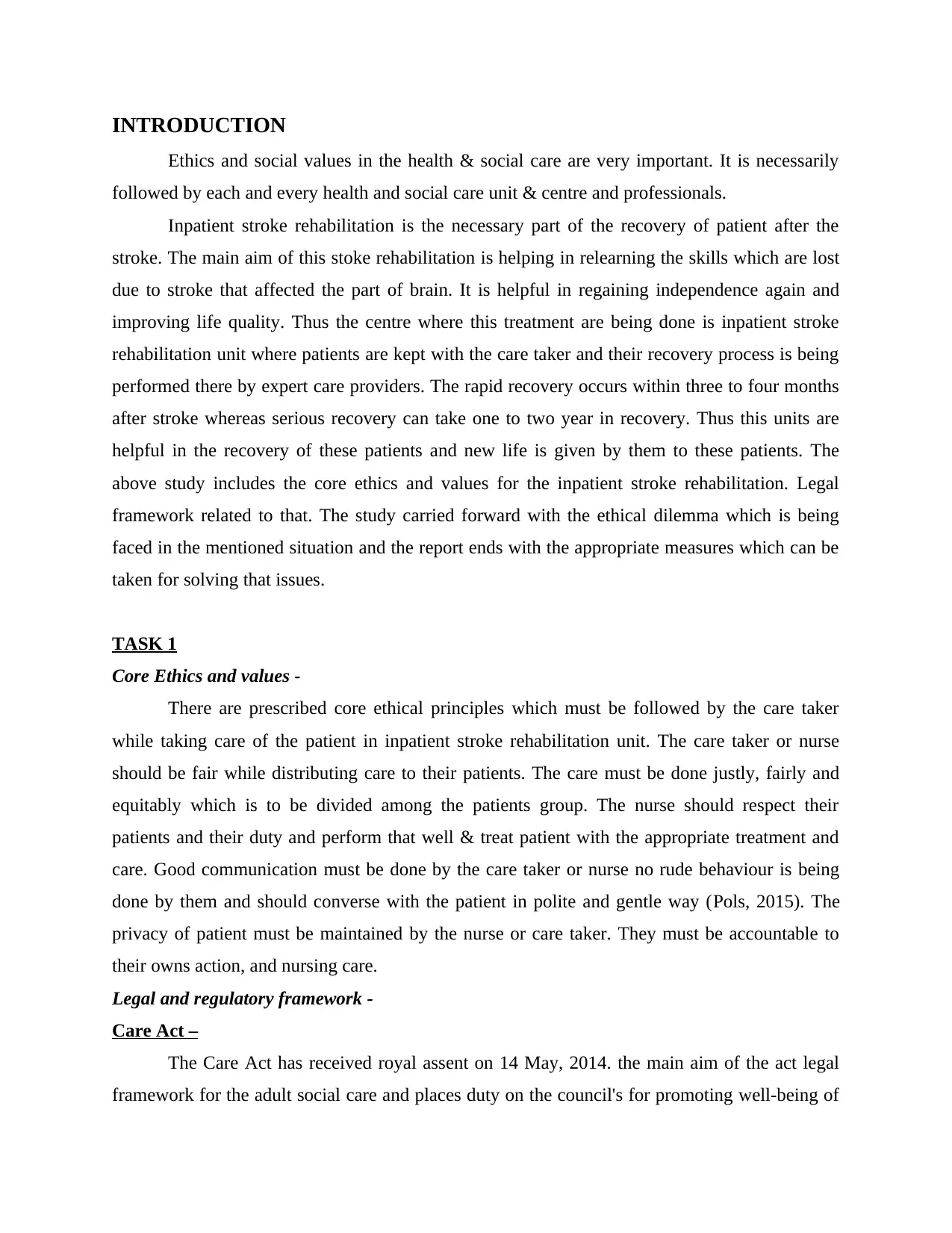
INTRODUCTION
Ethics and social values in the health & social care are very important. It is necessarily
followed by each and every health and social care unit & centre and professionals.
Inpatient stroke rehabilitation is the necessary part of the recovery of patient after the
stroke. The main aim of this stoke rehabilitation is helping in relearning the skills which are lost
due to stroke that affected the part of brain. It is helpful in regaining independence again and
improving life quality. Thus the centre where this treatment are being done is inpatient stroke
rehabilitation unit where patients are kept with the care taker and their recovery process is being
performed there by expert care providers. The rapid recovery occurs within three to four months
after stroke whereas serious recovery can take one to two year in recovery. Thus this units are
helpful in the recovery of these patients and new life is given by them to these patients. The
above study includes the core ethics and values for the inpatient stroke rehabilitation. Legal
framework related to that. The study carried forward with the ethical dilemma which is being
faced in the mentioned situation and the report ends with the appropriate measures which can be
taken for solving that issues.
TASK 1
Core Ethics and values -
There are prescribed core ethical principles which must be followed by the care taker
while taking care of the patient in inpatient stroke rehabilitation unit. The care taker or nurse
should be fair while distributing care to their patients. The care must be done justly, fairly and
equitably which is to be divided among the patients group. The nurse should respect their
patients and their duty and perform that well & treat patient with the appropriate treatment and
care. Good communication must be done by the care taker or nurse no rude behaviour is being
done by them and should converse with the patient in polite and gentle way (Pols, 2015). The
privacy of patient must be maintained by the nurse or care taker. They must be accountable to
their owns action, and nursing care.
Legal and regulatory framework -
Care Act –
The Care Act has received royal assent on 14 May, 2014. the main aim of the act legal
framework for the adult social care and places duty on the council's for promoting well-being of
Ethics and social values in the health & social care are very important. It is necessarily
followed by each and every health and social care unit & centre and professionals.
Inpatient stroke rehabilitation is the necessary part of the recovery of patient after the
stroke. The main aim of this stoke rehabilitation is helping in relearning the skills which are lost
due to stroke that affected the part of brain. It is helpful in regaining independence again and
improving life quality. Thus the centre where this treatment are being done is inpatient stroke
rehabilitation unit where patients are kept with the care taker and their recovery process is being
performed there by expert care providers. The rapid recovery occurs within three to four months
after stroke whereas serious recovery can take one to two year in recovery. Thus this units are
helpful in the recovery of these patients and new life is given by them to these patients. The
above study includes the core ethics and values for the inpatient stroke rehabilitation. Legal
framework related to that. The study carried forward with the ethical dilemma which is being
faced in the mentioned situation and the report ends with the appropriate measures which can be
taken for solving that issues.
TASK 1
Core Ethics and values -
There are prescribed core ethical principles which must be followed by the care taker
while taking care of the patient in inpatient stroke rehabilitation unit. The care taker or nurse
should be fair while distributing care to their patients. The care must be done justly, fairly and
equitably which is to be divided among the patients group. The nurse should respect their
patients and their duty and perform that well & treat patient with the appropriate treatment and
care. Good communication must be done by the care taker or nurse no rude behaviour is being
done by them and should converse with the patient in polite and gentle way (Pols, 2015). The
privacy of patient must be maintained by the nurse or care taker. They must be accountable to
their owns action, and nursing care.
Legal and regulatory framework -
Care Act –
The Care Act has received royal assent on 14 May, 2014. the main aim of the act legal
framework for the adult social care and places duty on the council's for promoting well-being of
⊘ This is a preview!⊘
Do you want full access?
Subscribe today to unlock all pages.

Trusted by 1+ million students worldwide
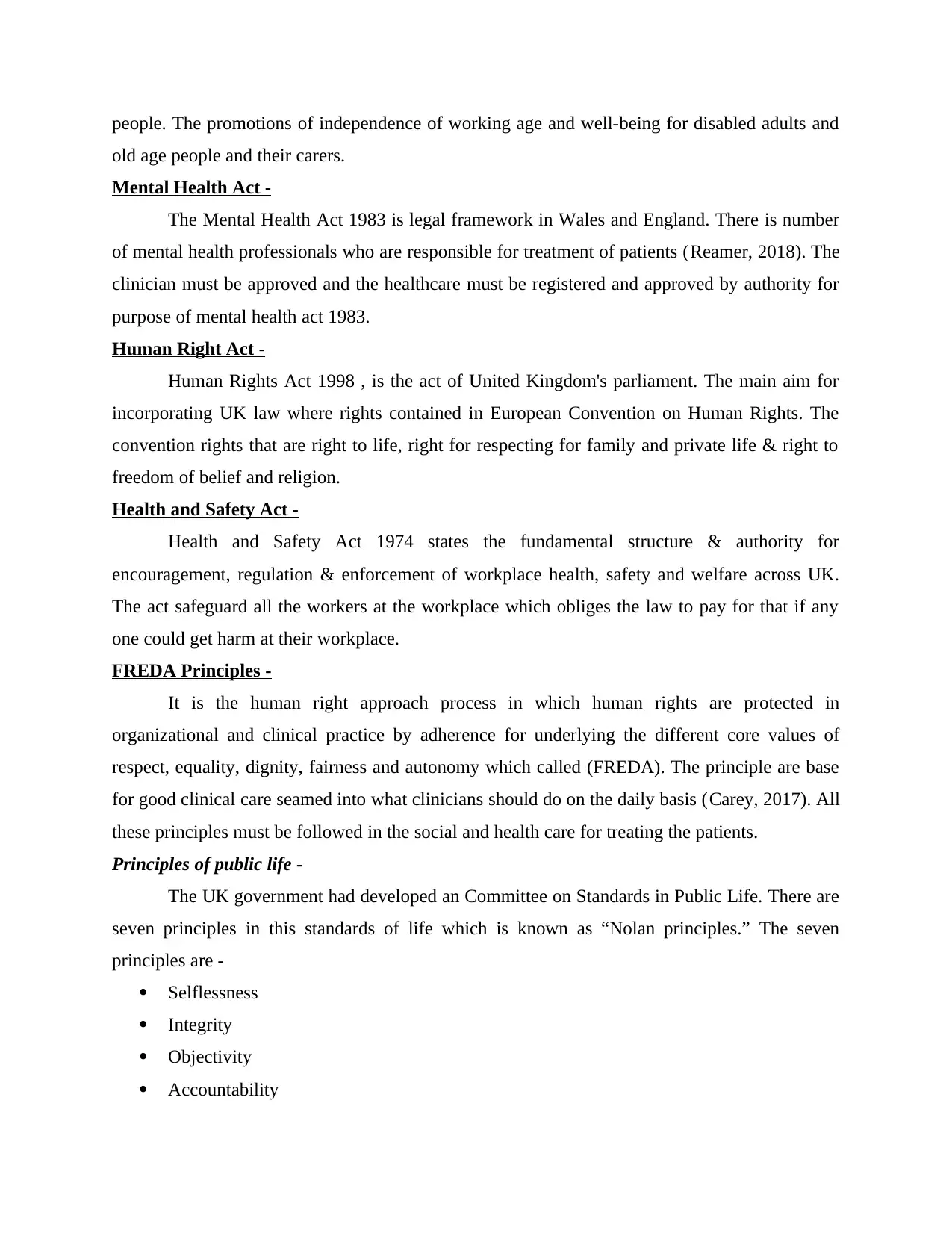
people. The promotions of independence of working age and well-being for disabled adults and
old age people and their carers.
Mental Health Act -
The Mental Health Act 1983 is legal framework in Wales and England. There is number
of mental health professionals who are responsible for treatment of patients (Reamer, 2018). The
clinician must be approved and the healthcare must be registered and approved by authority for
purpose of mental health act 1983.
Human Right Act -
Human Rights Act 1998 , is the act of United Kingdom's parliament. The main aim for
incorporating UK law where rights contained in European Convention on Human Rights. The
convention rights that are right to life, right for respecting for family and private life & right to
freedom of belief and religion.
Health and Safety Act -
Health and Safety Act 1974 states the fundamental structure & authority for
encouragement, regulation & enforcement of workplace health, safety and welfare across UK.
The act safeguard all the workers at the workplace which obliges the law to pay for that if any
one could get harm at their workplace.
FREDA Principles -
It is the human right approach process in which human rights are protected in
organizational and clinical practice by adherence for underlying the different core values of
respect, equality, dignity, fairness and autonomy which called (FREDA). The principle are base
for good clinical care seamed into what clinicians should do on the daily basis (Carey, 2017). All
these principles must be followed in the social and health care for treating the patients.
Principles of public life -
The UK government had developed an Committee on Standards in Public Life. There are
seven principles in this standards of life which is known as “Nolan principles.” The seven
principles are -
Selflessness
Integrity
Objectivity
Accountability
old age people and their carers.
Mental Health Act -
The Mental Health Act 1983 is legal framework in Wales and England. There is number
of mental health professionals who are responsible for treatment of patients (Reamer, 2018). The
clinician must be approved and the healthcare must be registered and approved by authority for
purpose of mental health act 1983.
Human Right Act -
Human Rights Act 1998 , is the act of United Kingdom's parliament. The main aim for
incorporating UK law where rights contained in European Convention on Human Rights. The
convention rights that are right to life, right for respecting for family and private life & right to
freedom of belief and religion.
Health and Safety Act -
Health and Safety Act 1974 states the fundamental structure & authority for
encouragement, regulation & enforcement of workplace health, safety and welfare across UK.
The act safeguard all the workers at the workplace which obliges the law to pay for that if any
one could get harm at their workplace.
FREDA Principles -
It is the human right approach process in which human rights are protected in
organizational and clinical practice by adherence for underlying the different core values of
respect, equality, dignity, fairness and autonomy which called (FREDA). The principle are base
for good clinical care seamed into what clinicians should do on the daily basis (Carey, 2017). All
these principles must be followed in the social and health care for treating the patients.
Principles of public life -
The UK government had developed an Committee on Standards in Public Life. There are
seven principles in this standards of life which is known as “Nolan principles.” The seven
principles are -
Selflessness
Integrity
Objectivity
Accountability
Paraphrase This Document
Need a fresh take? Get an instant paraphrase of this document with our AI Paraphraser
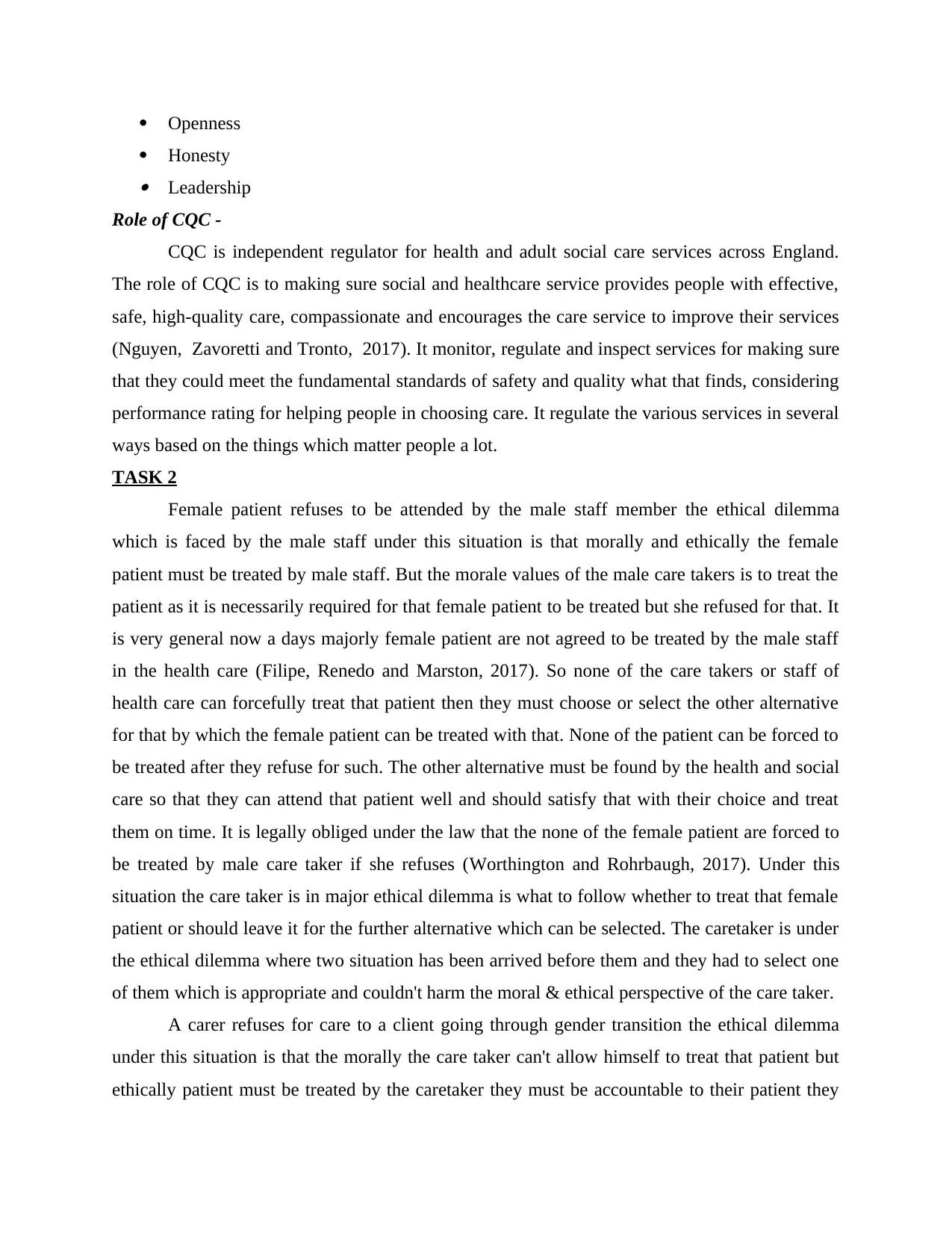
Openness
Honesty Leadership
Role of CQC -
CQC is independent regulator for health and adult social care services across England.
The role of CQC is to making sure social and healthcare service provides people with effective,
safe, high-quality care, compassionate and encourages the care service to improve their services
(Nguyen, Zavoretti and Tronto, 2017). It monitor, regulate and inspect services for making sure
that they could meet the fundamental standards of safety and quality what that finds, considering
performance rating for helping people in choosing care. It regulate the various services in several
ways based on the things which matter people a lot.
TASK 2
Female patient refuses to be attended by the male staff member the ethical dilemma
which is faced by the male staff under this situation is that morally and ethically the female
patient must be treated by male staff. But the morale values of the male care takers is to treat the
patient as it is necessarily required for that female patient to be treated but she refused for that. It
is very general now a days majorly female patient are not agreed to be treated by the male staff
in the health care (Filipe, Renedo and Marston, 2017). So none of the care takers or staff of
health care can forcefully treat that patient then they must choose or select the other alternative
for that by which the female patient can be treated with that. None of the patient can be forced to
be treated after they refuse for such. The other alternative must be found by the health and social
care so that they can attend that patient well and should satisfy that with their choice and treat
them on time. It is legally obliged under the law that the none of the female patient are forced to
be treated by male care taker if she refuses (Worthington and Rohrbaugh, 2017). Under this
situation the care taker is in major ethical dilemma is what to follow whether to treat that female
patient or should leave it for the further alternative which can be selected. The caretaker is under
the ethical dilemma where two situation has been arrived before them and they had to select one
of them which is appropriate and couldn't harm the moral & ethical perspective of the care taker.
A carer refuses for care to a client going through gender transition the ethical dilemma
under this situation is that the morally the care taker can't allow himself to treat that patient but
ethically patient must be treated by the caretaker they must be accountable to their patient they
Honesty Leadership
Role of CQC -
CQC is independent regulator for health and adult social care services across England.
The role of CQC is to making sure social and healthcare service provides people with effective,
safe, high-quality care, compassionate and encourages the care service to improve their services
(Nguyen, Zavoretti and Tronto, 2017). It monitor, regulate and inspect services for making sure
that they could meet the fundamental standards of safety and quality what that finds, considering
performance rating for helping people in choosing care. It regulate the various services in several
ways based on the things which matter people a lot.
TASK 2
Female patient refuses to be attended by the male staff member the ethical dilemma
which is faced by the male staff under this situation is that morally and ethically the female
patient must be treated by male staff. But the morale values of the male care takers is to treat the
patient as it is necessarily required for that female patient to be treated but she refused for that. It
is very general now a days majorly female patient are not agreed to be treated by the male staff
in the health care (Filipe, Renedo and Marston, 2017). So none of the care takers or staff of
health care can forcefully treat that patient then they must choose or select the other alternative
for that by which the female patient can be treated with that. None of the patient can be forced to
be treated after they refuse for such. The other alternative must be found by the health and social
care so that they can attend that patient well and should satisfy that with their choice and treat
them on time. It is legally obliged under the law that the none of the female patient are forced to
be treated by male care taker if she refuses (Worthington and Rohrbaugh, 2017). Under this
situation the care taker is in major ethical dilemma is what to follow whether to treat that female
patient or should leave it for the further alternative which can be selected. The caretaker is under
the ethical dilemma where two situation has been arrived before them and they had to select one
of them which is appropriate and couldn't harm the moral & ethical perspective of the care taker.
A carer refuses for care to a client going through gender transition the ethical dilemma
under this situation is that the morally the care taker can't allow himself to treat that patient but
ethically patient must be treated by the caretaker they must be accountable to their patient they
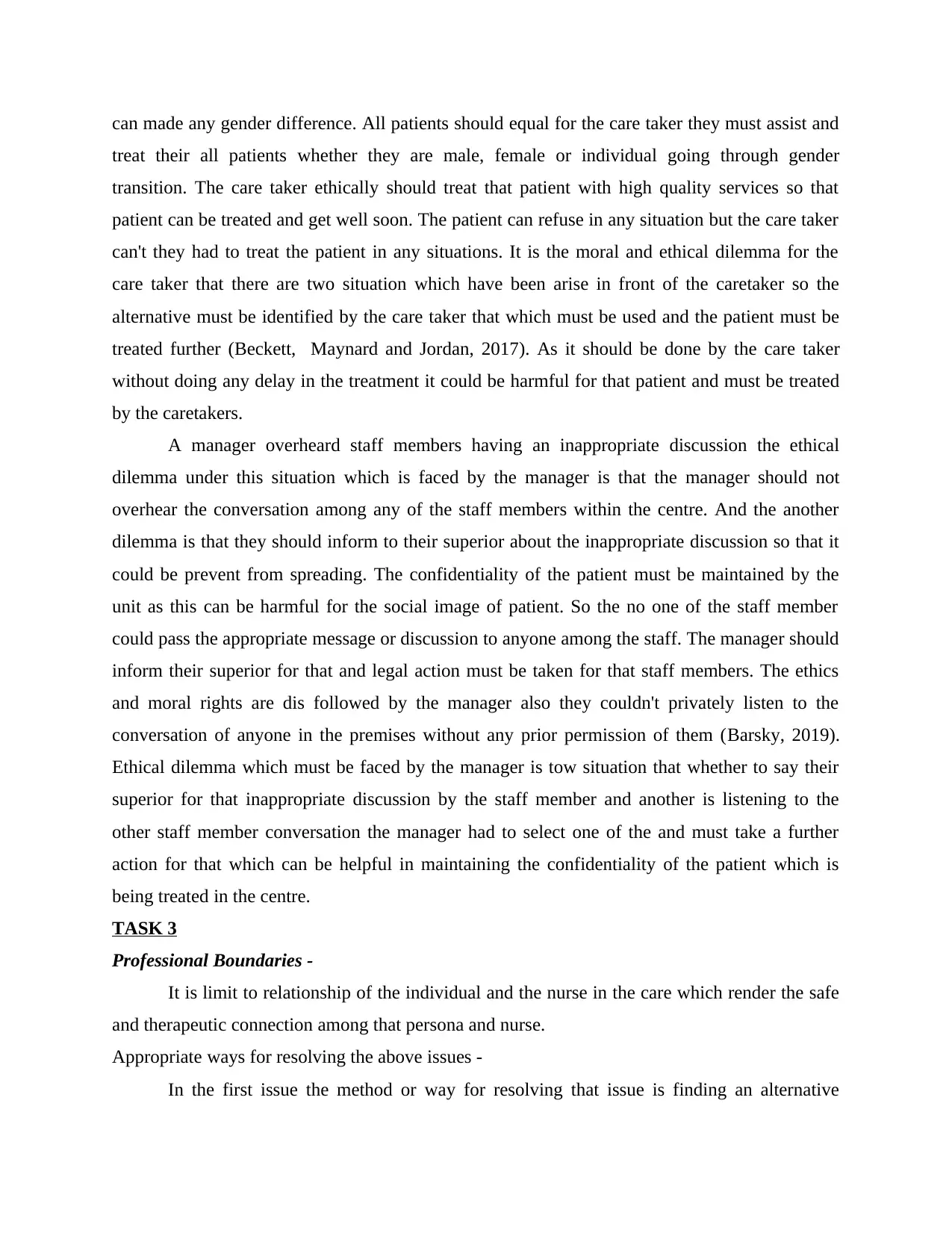
can made any gender difference. All patients should equal for the care taker they must assist and
treat their all patients whether they are male, female or individual going through gender
transition. The care taker ethically should treat that patient with high quality services so that
patient can be treated and get well soon. The patient can refuse in any situation but the care taker
can't they had to treat the patient in any situations. It is the moral and ethical dilemma for the
care taker that there are two situation which have been arise in front of the caretaker so the
alternative must be identified by the care taker that which must be used and the patient must be
treated further (Beckett, Maynard and Jordan, 2017). As it should be done by the care taker
without doing any delay in the treatment it could be harmful for that patient and must be treated
by the caretakers.
A manager overheard staff members having an inappropriate discussion the ethical
dilemma under this situation which is faced by the manager is that the manager should not
overhear the conversation among any of the staff members within the centre. And the another
dilemma is that they should inform to their superior about the inappropriate discussion so that it
could be prevent from spreading. The confidentiality of the patient must be maintained by the
unit as this can be harmful for the social image of patient. So the no one of the staff member
could pass the appropriate message or discussion to anyone among the staff. The manager should
inform their superior for that and legal action must be taken for that staff members. The ethics
and moral rights are dis followed by the manager also they couldn't privately listen to the
conversation of anyone in the premises without any prior permission of them (Barsky, 2019).
Ethical dilemma which must be faced by the manager is tow situation that whether to say their
superior for that inappropriate discussion by the staff member and another is listening to the
other staff member conversation the manager had to select one of the and must take a further
action for that which can be helpful in maintaining the confidentiality of the patient which is
being treated in the centre.
TASK 3
Professional Boundaries -
It is limit to relationship of the individual and the nurse in the care which render the safe
and therapeutic connection among that persona and nurse.
Appropriate ways for resolving the above issues -
In the first issue the method or way for resolving that issue is finding an alternative
treat their all patients whether they are male, female or individual going through gender
transition. The care taker ethically should treat that patient with high quality services so that
patient can be treated and get well soon. The patient can refuse in any situation but the care taker
can't they had to treat the patient in any situations. It is the moral and ethical dilemma for the
care taker that there are two situation which have been arise in front of the caretaker so the
alternative must be identified by the care taker that which must be used and the patient must be
treated further (Beckett, Maynard and Jordan, 2017). As it should be done by the care taker
without doing any delay in the treatment it could be harmful for that patient and must be treated
by the caretakers.
A manager overheard staff members having an inappropriate discussion the ethical
dilemma under this situation which is faced by the manager is that the manager should not
overhear the conversation among any of the staff members within the centre. And the another
dilemma is that they should inform to their superior about the inappropriate discussion so that it
could be prevent from spreading. The confidentiality of the patient must be maintained by the
unit as this can be harmful for the social image of patient. So the no one of the staff member
could pass the appropriate message or discussion to anyone among the staff. The manager should
inform their superior for that and legal action must be taken for that staff members. The ethics
and moral rights are dis followed by the manager also they couldn't privately listen to the
conversation of anyone in the premises without any prior permission of them (Barsky, 2019).
Ethical dilemma which must be faced by the manager is tow situation that whether to say their
superior for that inappropriate discussion by the staff member and another is listening to the
other staff member conversation the manager had to select one of the and must take a further
action for that which can be helpful in maintaining the confidentiality of the patient which is
being treated in the centre.
TASK 3
Professional Boundaries -
It is limit to relationship of the individual and the nurse in the care which render the safe
and therapeutic connection among that persona and nurse.
Appropriate ways for resolving the above issues -
In the first issue the method or way for resolving that issue is finding an alternative
⊘ This is a preview!⊘
Do you want full access?
Subscribe today to unlock all pages.

Trusted by 1+ million students worldwide
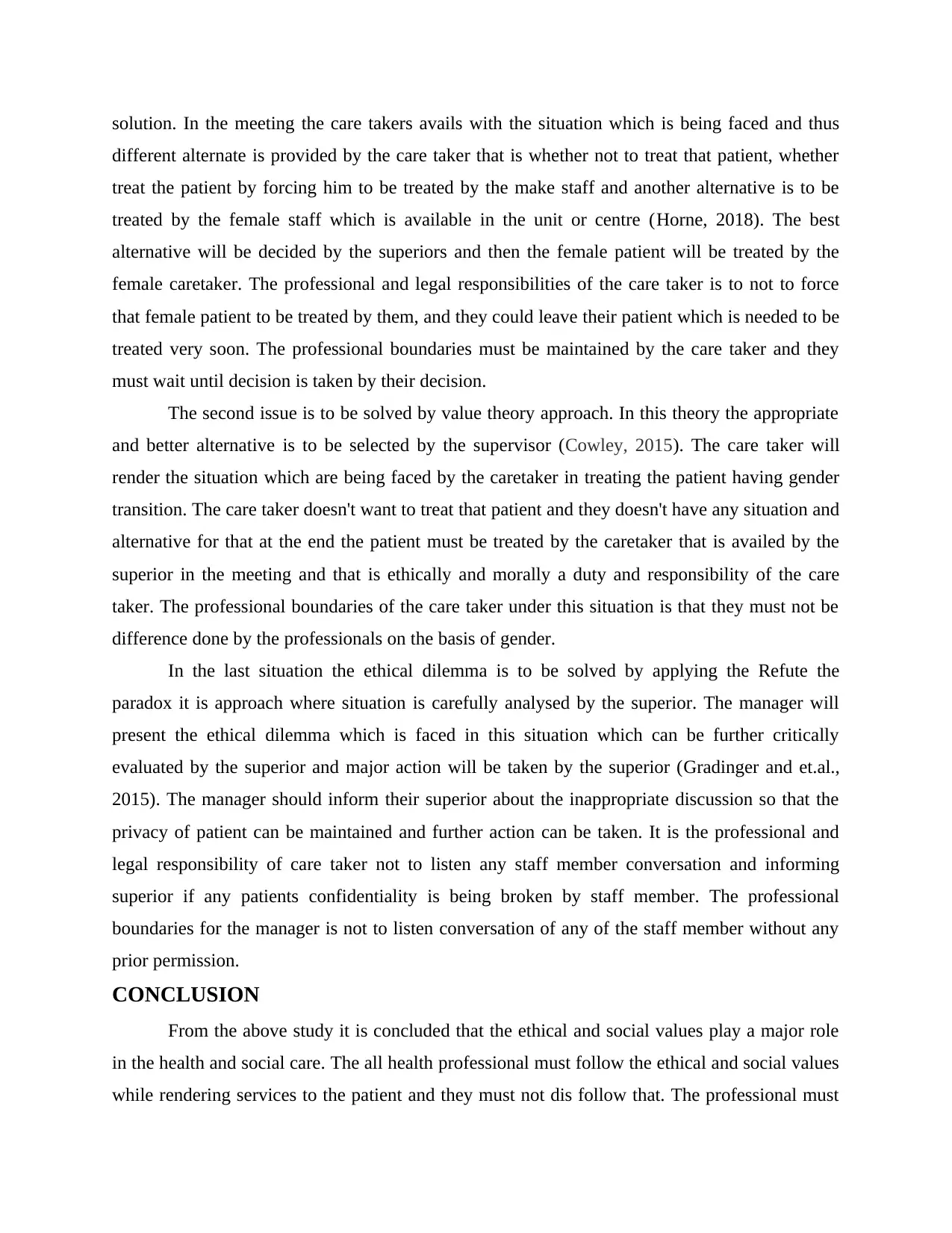
solution. In the meeting the care takers avails with the situation which is being faced and thus
different alternate is provided by the care taker that is whether not to treat that patient, whether
treat the patient by forcing him to be treated by the make staff and another alternative is to be
treated by the female staff which is available in the unit or centre (Horne, 2018). The best
alternative will be decided by the superiors and then the female patient will be treated by the
female caretaker. The professional and legal responsibilities of the care taker is to not to force
that female patient to be treated by them, and they could leave their patient which is needed to be
treated very soon. The professional boundaries must be maintained by the care taker and they
must wait until decision is taken by their decision.
The second issue is to be solved by value theory approach. In this theory the appropriate
and better alternative is to be selected by the supervisor (Cowley, 2015). The care taker will
render the situation which are being faced by the caretaker in treating the patient having gender
transition. The care taker doesn't want to treat that patient and they doesn't have any situation and
alternative for that at the end the patient must be treated by the caretaker that is availed by the
superior in the meeting and that is ethically and morally a duty and responsibility of the care
taker. The professional boundaries of the care taker under this situation is that they must not be
difference done by the professionals on the basis of gender.
In the last situation the ethical dilemma is to be solved by applying the Refute the
paradox it is approach where situation is carefully analysed by the superior. The manager will
present the ethical dilemma which is faced in this situation which can be further critically
evaluated by the superior and major action will be taken by the superior (Gradinger and et.al.,
2015). The manager should inform their superior about the inappropriate discussion so that the
privacy of patient can be maintained and further action can be taken. It is the professional and
legal responsibility of care taker not to listen any staff member conversation and informing
superior if any patients confidentiality is being broken by staff member. The professional
boundaries for the manager is not to listen conversation of any of the staff member without any
prior permission.
CONCLUSION
From the above study it is concluded that the ethical and social values play a major role
in the health and social care. The all health professional must follow the ethical and social values
while rendering services to the patient and they must not dis follow that. The professional must
different alternate is provided by the care taker that is whether not to treat that patient, whether
treat the patient by forcing him to be treated by the make staff and another alternative is to be
treated by the female staff which is available in the unit or centre (Horne, 2018). The best
alternative will be decided by the superiors and then the female patient will be treated by the
female caretaker. The professional and legal responsibilities of the care taker is to not to force
that female patient to be treated by them, and they could leave their patient which is needed to be
treated very soon. The professional boundaries must be maintained by the care taker and they
must wait until decision is taken by their decision.
The second issue is to be solved by value theory approach. In this theory the appropriate
and better alternative is to be selected by the supervisor (Cowley, 2015). The care taker will
render the situation which are being faced by the caretaker in treating the patient having gender
transition. The care taker doesn't want to treat that patient and they doesn't have any situation and
alternative for that at the end the patient must be treated by the caretaker that is availed by the
superior in the meeting and that is ethically and morally a duty and responsibility of the care
taker. The professional boundaries of the care taker under this situation is that they must not be
difference done by the professionals on the basis of gender.
In the last situation the ethical dilemma is to be solved by applying the Refute the
paradox it is approach where situation is carefully analysed by the superior. The manager will
present the ethical dilemma which is faced in this situation which can be further critically
evaluated by the superior and major action will be taken by the superior (Gradinger and et.al.,
2015). The manager should inform their superior about the inappropriate discussion so that the
privacy of patient can be maintained and further action can be taken. It is the professional and
legal responsibility of care taker not to listen any staff member conversation and informing
superior if any patients confidentiality is being broken by staff member. The professional
boundaries for the manager is not to listen conversation of any of the staff member without any
prior permission.
CONCLUSION
From the above study it is concluded that the ethical and social values play a major role
in the health and social care. The all health professional must follow the ethical and social values
while rendering services to the patient and they must not dis follow that. The professional must
Paraphrase This Document
Need a fresh take? Get an instant paraphrase of this document with our AI Paraphraser
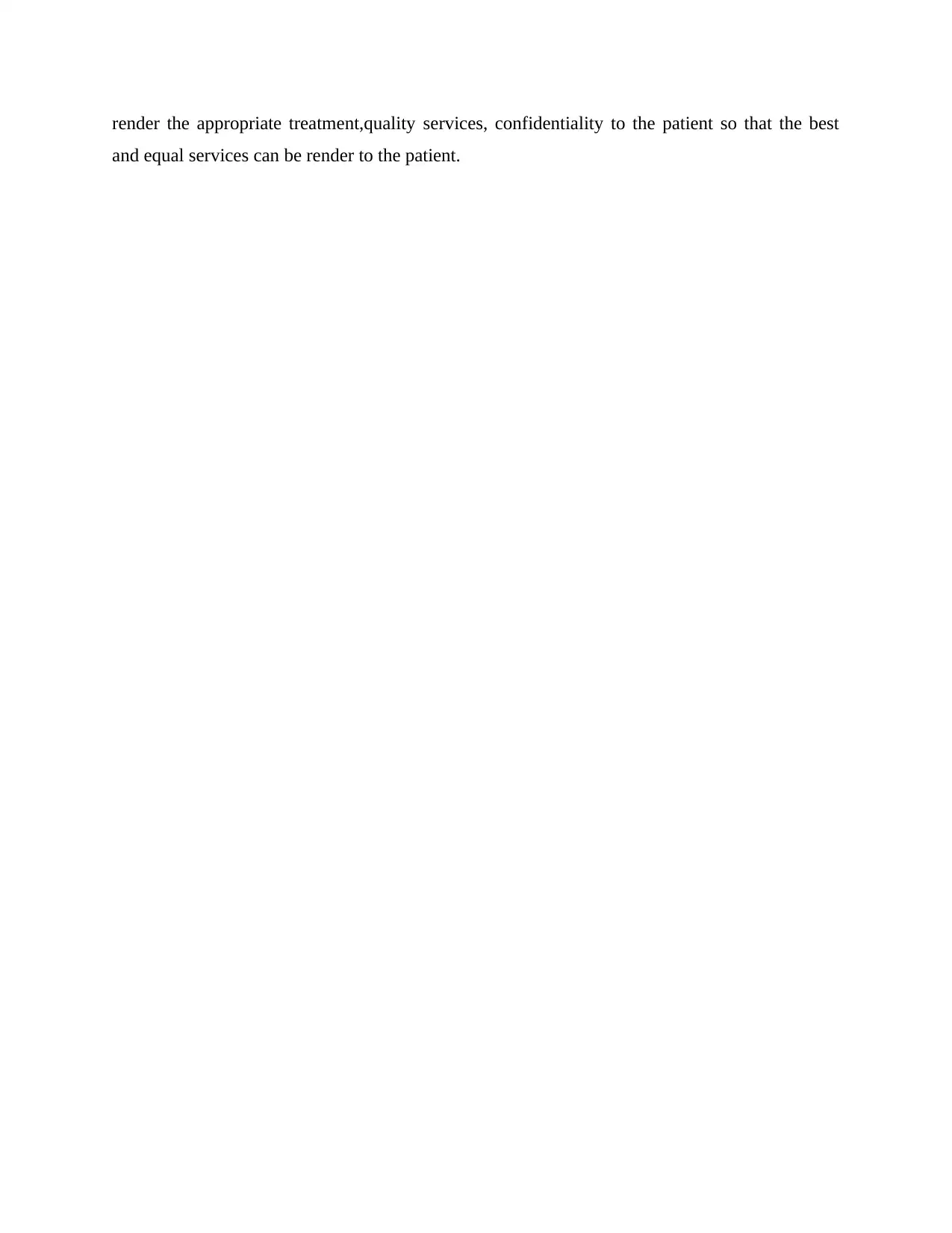
render the appropriate treatment,quality services, confidentiality to the patient so that the best
and equal services can be render to the patient.
and equal services can be render to the patient.
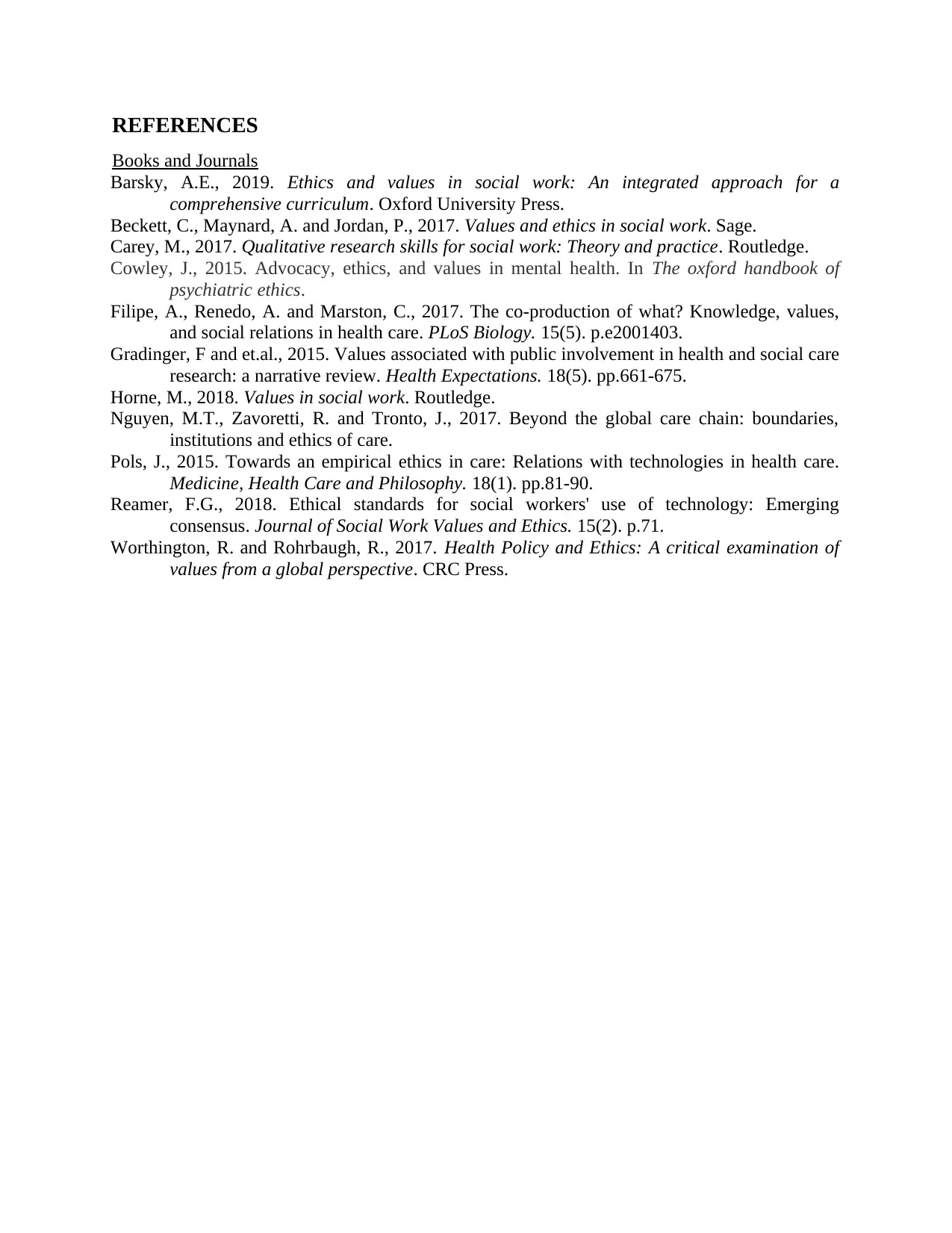
REFERENCES
Books and Journals
Barsky, A.E., 2019. Ethics and values in social work: An integrated approach for a
comprehensive curriculum. Oxford University Press.
Beckett, C., Maynard, A. and Jordan, P., 2017. Values and ethics in social work. Sage.
Carey, M., 2017. Qualitative research skills for social work: Theory and practice. Routledge.
Cowley, J., 2015. Advocacy, ethics, and values in mental health. In The oxford handbook of
psychiatric ethics.
Filipe, A., Renedo, A. and Marston, C., 2017. The co-production of what? Knowledge, values,
and social relations in health care. PLoS Biology. 15(5). p.e2001403.
Gradinger, F and et.al., 2015. Values associated with public involvement in health and social care
research: a narrative review. Health Expectations. 18(5). pp.661-675.
Horne, M., 2018. Values in social work. Routledge.
Nguyen, M.T., Zavoretti, R. and Tronto, J., 2017. Beyond the global care chain: boundaries,
institutions and ethics of care.
Pols, J., 2015. Towards an empirical ethics in care: Relations with technologies in health care.
Medicine, Health Care and Philosophy. 18(1). pp.81-90.
Reamer, F.G., 2018. Ethical standards for social workers' use of technology: Emerging
consensus. Journal of Social Work Values and Ethics. 15(2). p.71.
Worthington, R. and Rohrbaugh, R., 2017. Health Policy and Ethics: A critical examination of
values from a global perspective. CRC Press.
Books and Journals
Barsky, A.E., 2019. Ethics and values in social work: An integrated approach for a
comprehensive curriculum. Oxford University Press.
Beckett, C., Maynard, A. and Jordan, P., 2017. Values and ethics in social work. Sage.
Carey, M., 2017. Qualitative research skills for social work: Theory and practice. Routledge.
Cowley, J., 2015. Advocacy, ethics, and values in mental health. In The oxford handbook of
psychiatric ethics.
Filipe, A., Renedo, A. and Marston, C., 2017. The co-production of what? Knowledge, values,
and social relations in health care. PLoS Biology. 15(5). p.e2001403.
Gradinger, F and et.al., 2015. Values associated with public involvement in health and social care
research: a narrative review. Health Expectations. 18(5). pp.661-675.
Horne, M., 2018. Values in social work. Routledge.
Nguyen, M.T., Zavoretti, R. and Tronto, J., 2017. Beyond the global care chain: boundaries,
institutions and ethics of care.
Pols, J., 2015. Towards an empirical ethics in care: Relations with technologies in health care.
Medicine, Health Care and Philosophy. 18(1). pp.81-90.
Reamer, F.G., 2018. Ethical standards for social workers' use of technology: Emerging
consensus. Journal of Social Work Values and Ethics. 15(2). p.71.
Worthington, R. and Rohrbaugh, R., 2017. Health Policy and Ethics: A critical examination of
values from a global perspective. CRC Press.
⊘ This is a preview!⊘
Do you want full access?
Subscribe today to unlock all pages.

Trusted by 1+ million students worldwide
1 out of 9
Related Documents
Your All-in-One AI-Powered Toolkit for Academic Success.
+13062052269
info@desklib.com
Available 24*7 on WhatsApp / Email
![[object Object]](/_next/static/media/star-bottom.7253800d.svg)
Unlock your academic potential
Copyright © 2020–2026 A2Z Services. All Rights Reserved. Developed and managed by ZUCOL.





